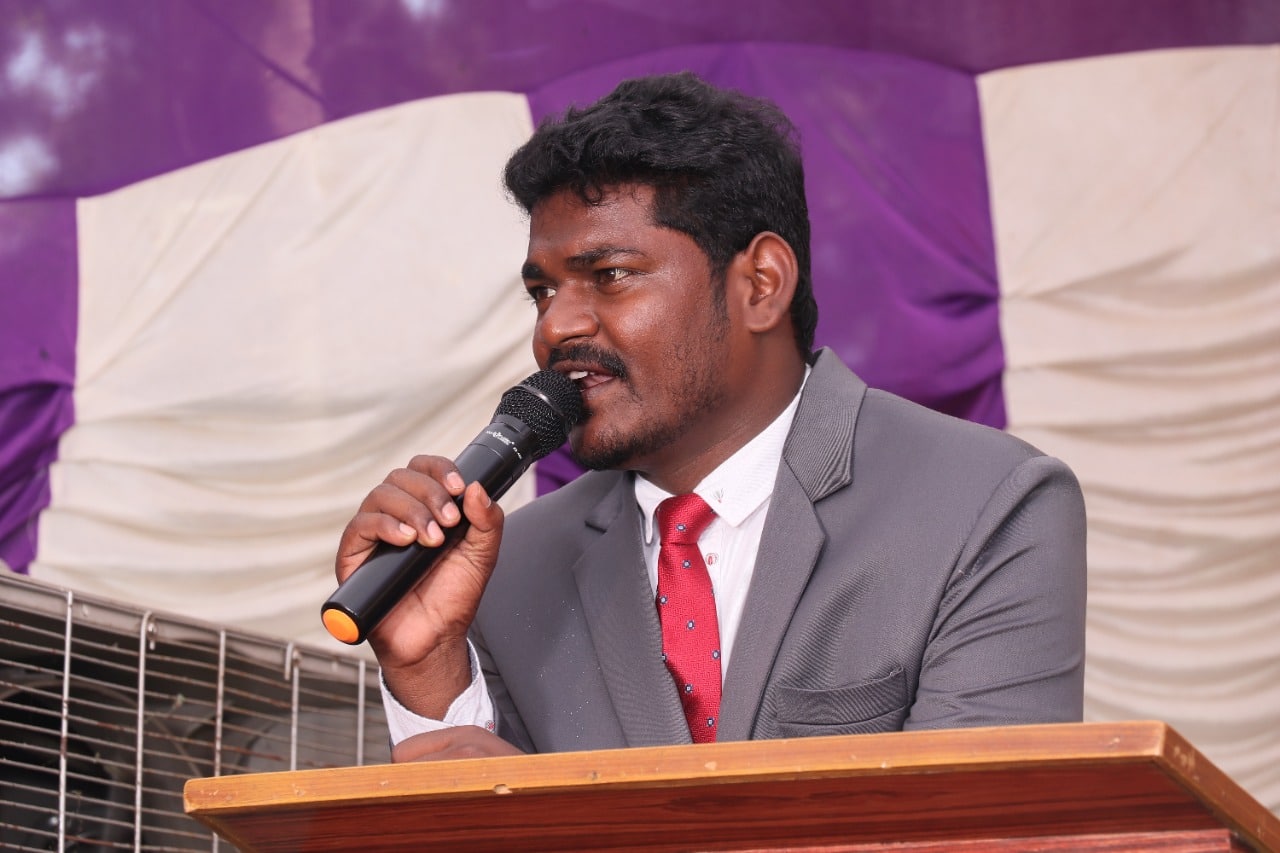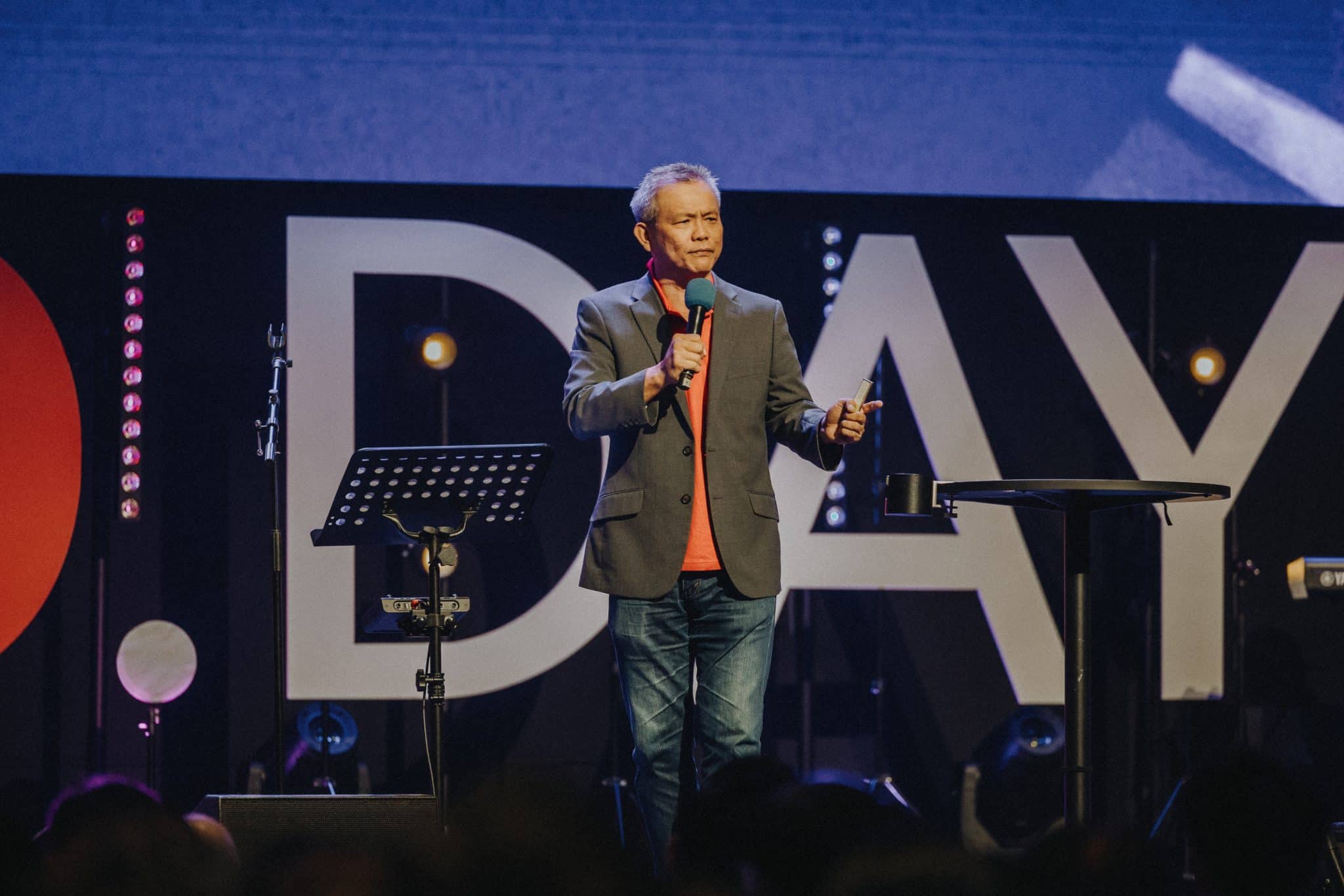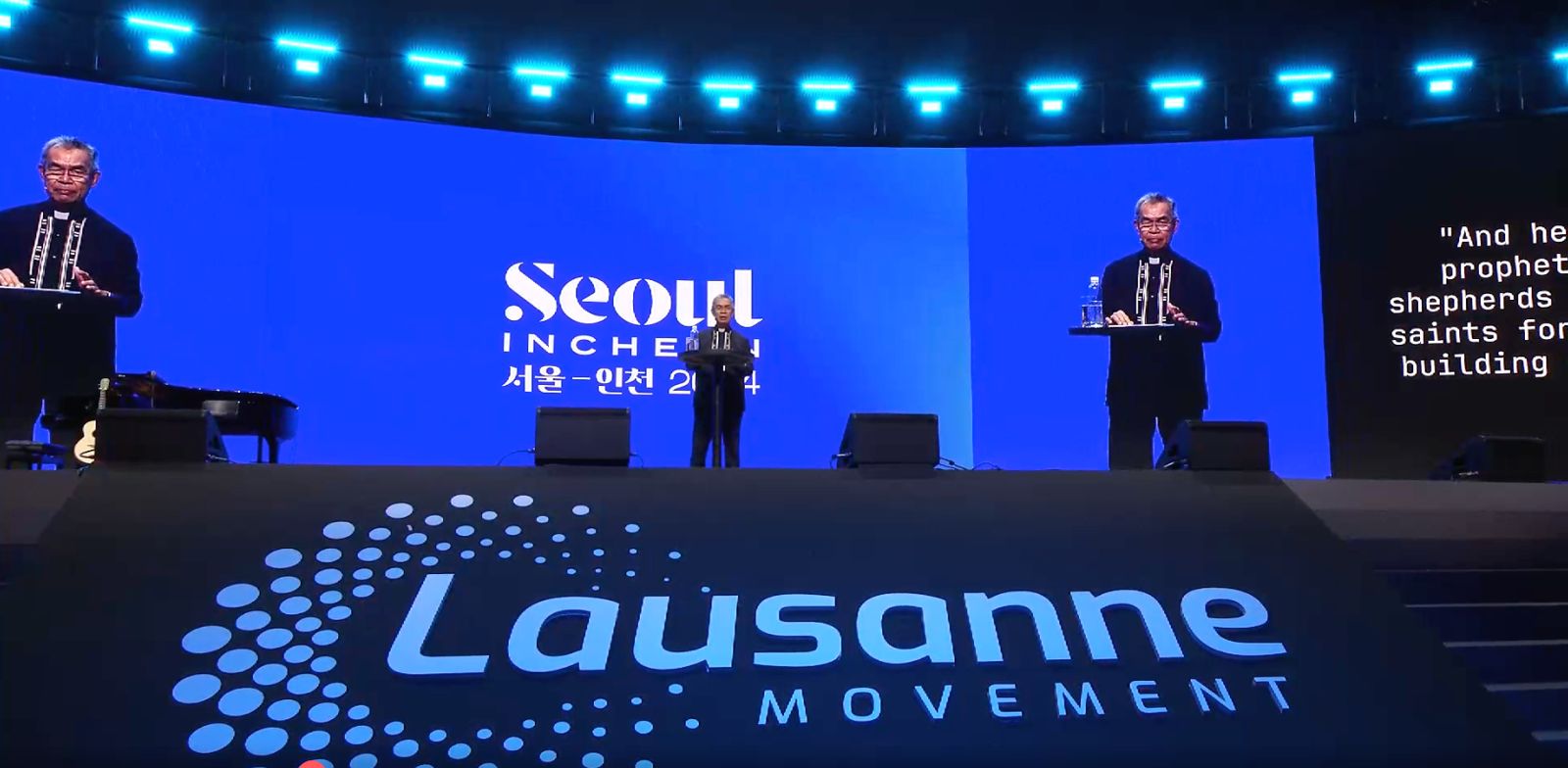Nothing but “constant grace”: Gangster encounters God in prison, marries his counsellor and becomes a pastor
by Janice Tai // June 10, 2022, 7:20 pm
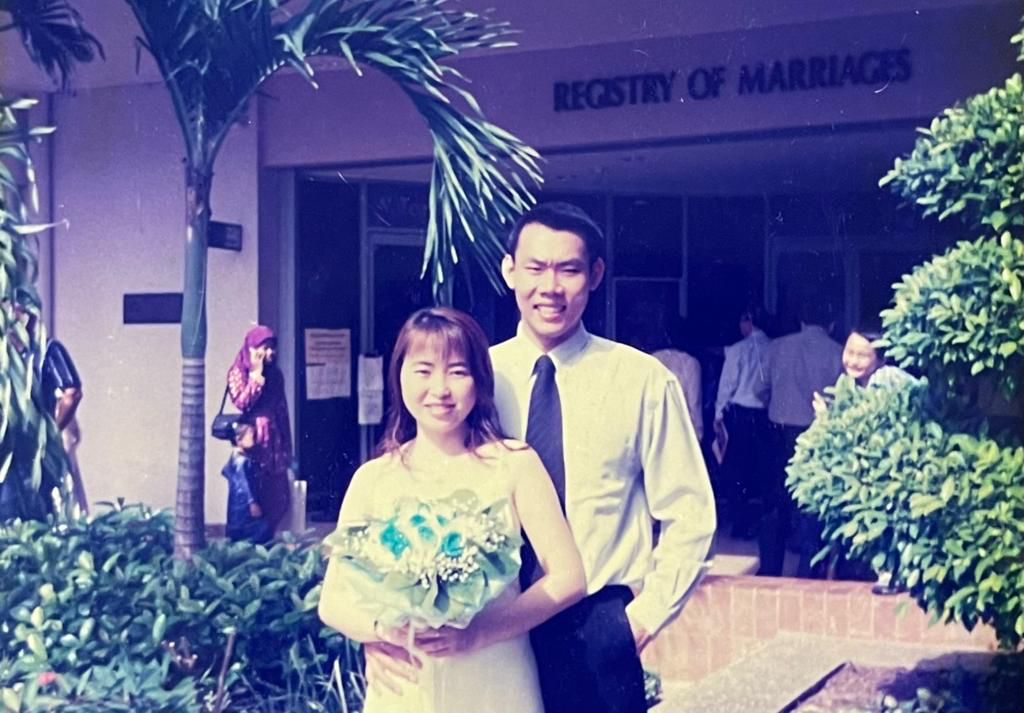
Christ alone: Anthony Chua, a former drug trafficker, encountered Christ while in prison and ended up marrying his prison counsellor, Serina Ching. All photos courtesy of Anthony Chua.
Anthony Chua’s childhood was marked by separation.
First, his mother left the family in 1978 after frequent quarrels with his father.
Shortly afterward, his father left him and his two older siblings at Chen Su Lan Methodist Children’s Home. Anthony was just two or three years old.
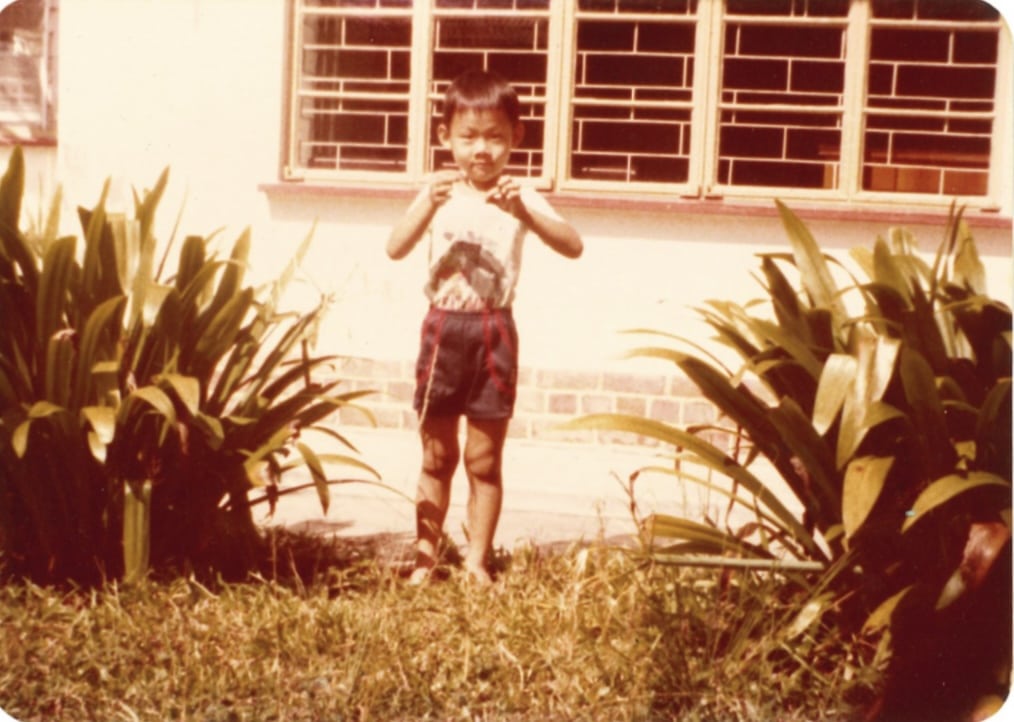
A semblance of a home: Young Anthony was put in Chen Su Lan Methodist Children’s Home for a season.
The family had no place of their own and used to squeeze with their grandparents in a kampung house.
Finally, when he was five, his father came to take him and his siblings back after managing to secure a rental flat. But, one by one, his older brother and sister left to live with their mother instead.
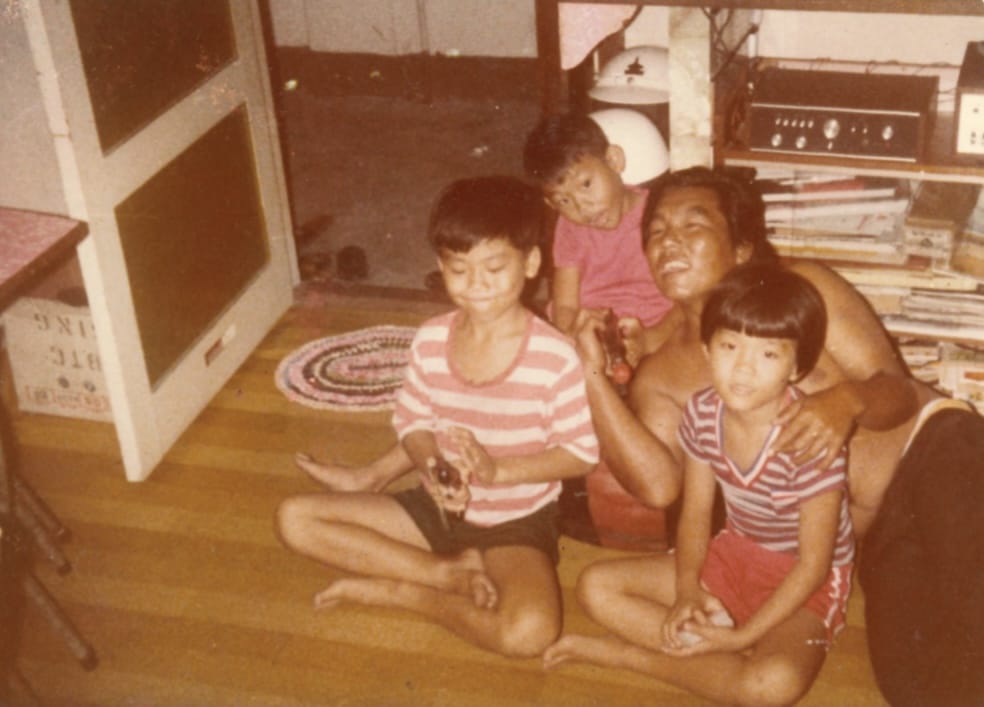
Short-lived togetherness: Anthony (top) with his older siblings and father in their rented flat.
Anthony did not follow suit as he did not want to leave his father, an excavator and driver, all by himself. “I felt that he is quite ‘kelian’ (pitiful),” he said.
“My father was a hardworking man so I often went with him to his work construction sites.”
“I felt lost, unwanted and lonely then.”
Anthony was nine when his father remarried. Once again, he found himself having to adjust to a new family and environment. Family squabbles returned.
“I felt lost, unwanted and lonely then,” said Anthony, now 47.
Though he did well in primary school, his grades plunged in secondary school when he started hanging out with members of an infamous secret society gang.
His seniors in school belonged to different secret societies and each had offered him “protection” and “brotherhood” should he choose to join them. He went with the heavyweights, and officially became a part of the “18 gang” when he was in Secondary 1.
The infamous “18 gang”
Anthony spent those wayward years engaging in “basic” gangster activities – rioting, extortion, smoking, gambling, womanising and doing drugs.
The 18 gang were based in a snooker centre at the old Hougang bus interchange. Its members were unafraid to enact violence whenever needed, whether it was slashing with parangs (knives), lighting petrol bombs, or throwing acid bombs towards members of rival gangs should there be disputes over, say, “territory”.
Anthony’s first brush with the law came in 1993, while he was serving his National Service. After booking out from camp for the weekend, he headed to 18’s headquarters to gather with the gang.

Bold and brash: Anthony with a fellow gang member near 18’s Hougang headquarters.
The Secret Society Branch of the police had already been tracking them, and raided their nest. The officers found not only evidence of illegal secret society activities, but also an unexpected “bonus”: Cannabis was discovered on Anthony.
“Can you let me go? Give me a second chance?” Anthony pleaded, to no avail.
“They thought DB could change me, but it did not.”
The NSman was sentenced to 20 months in Detention Barracks (DB) for the possession and consumption of cannabis.
“They thought DB could change me, but it did not.
“I just treated it as a free gym, using the sandbags in there to come up with my own exercise regime. We all became very buff in there,” he said.
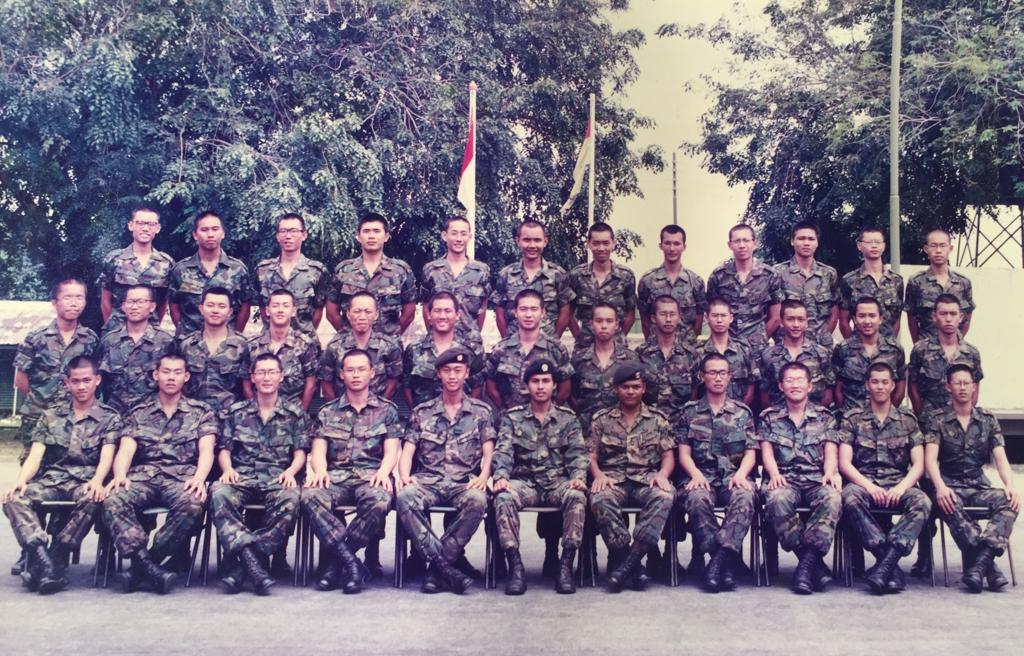
A fighter from the start: Anthony (first row, second from left) during Basic Military Training (BMT).
Being in DB expanded his network of people who were exposed to crime. He came out emboldened and eager to start a “new lease of life” as a gangster at a time when an Ecstasy tsunami was sweeping through the Southeast Asian region.
Clubbers and discotheque-goers were hankering after the drug, and the demand drove up prices. One Ecstacy pill could cost up to $150.
“We thought we would be able to either fly under the radar or beat the system.”
Riding on its popularity, Anthony and his gang members began trafficking the drug into Singapore.
It was a lucrative trade. They earned thousands of dollars a day because their profit margins were high.
With the money, they splurged by living in hotels every day and driving flashy sports cars. They also committed some of the funds into an illegal moneylending business.
“We were young, foolish and daring. Our confidence came from being ignorant of the law. We thought we would be able to either fly under the radar or beat the system.”
He never thought his drug runner — who was eventually caught — would rat on him. In 1997, Anthony was ambushed by police officers in a discotheque.
While he was out on bail, his loanshark syndicate was also busted by the police. “Some people said my luck ran out, but on hindsight, God needed to get my attention.”
Maximum security
To discourage Ecstasy use, the law was changed to reclassify the drug from Class C to Class A. That meant heavier sentences for those found possessing or trafficking it.
For possessing and trafficking Ecstasy, as well as engaging in illegal moneylending, Anthony was sentenced to the maximum security prison at Changi for a term of six years and four months. He was also due to receive five strokes of the cane.
Maximum security prison was where they sent the worst criminals – the hardened secret society gangsters and others such as the “lifers” (those who received life imprisonment).
“Was he heartbroken because of my sentence? Am I the cause of his stroke?”
Anthony was just getting adjusted to the new environment and awaiting with trepidation the date of his caning when he received news that his father had passed away from a stroke and a subsequent fall.
“That news was more painful than the caning,” he said.
“I visited him when he was in a coma for 10 minutes, and could only visit his wake for 10 minutes while I was in handcuffs.”
Guilt hung over his head. He wondered: “Was he heartbroken because of my sentence? Am I the cause of his stroke?”
While he could not be present for much of the wake, his gang members turned up almost every day to represent him and assist his family. “They were really helpful and I was indebted to them,” said Anthony, who was only in his early 20s then.
Skills upgrading
Meantime, Anthony happened to read a book about prisoners in a Russian prison who studied while incarcerated. All of them came out with an education. He found himself strangely inspired.
“As my network got bigger here in prison, I also needed to ‘upgrade’ myself as a gangster,” he said. His dream was to start a large-scale organisation upon his release — one that would manage the different gangs in Singapore.
Motivated, he went to the prison library to borrow and read books on business management, philosophy and human psychology. He also began studying for his ‘N’ levels and managed to pass all of the subjects he sat for.
He got so used to life in the maximum security prison that it became his comfort zone.
Other inmates were careful about stepping on his toes, as he was now known as the official “Dai Gong” (leader) of the 18 gang in the prison. He was responsible for taking care of his members and would handle any issues that arose with rival gangs in the prison.
Untimely transfers?
Anthony had about 10 months left before his release when he found himself transferred to Admiralty West prison.
He assumed he was to remain there until his release but ended up being there less than two weeks, after an officer asked if he was a student in prison.
He replied in the affirmative, saying he had done his ‘N’ levels and was studying for his ‘O’ levels. The officer then asked for his prison inmate identification number, and Anthony was moved yet again – this time to Kaki Bukit Prison School.
“We rough criminals would never talk to officers so it was mind-blowing.”
Such transfers were unheard of. “I couldn’t believe it!” Anthony said.
“They put me, a hardcore prisoner from ‘maximum security’, with all the young prisoners from Reformative Training Centre who were under 21 years old!”
It turned out that he was part of a pioneer batch of a new initiative aimed at providing a more rehabilitative programme by offering life skills training.
But Anthony hated his new environment.
At the maximum security prison, he shared a cell with three men. At Kaki Bukit, he had to live in a dormitory of over 20 men. The officers addressed them by name instead of a set of numbers.
“The men in my dorm were mostly Christians. They were all so sissy and gentle. Every morning they would wake up to read their Bible and sing Christian songs.
“They also talked to the police officers like (they were) friends. We rough criminals would never talk to officers so it was mind-blowing.”
Anthony felt like he stuck out like a sore thumb and constantly picked fights with others during his first week there.
Future ready
However, Kaki Bukit Prison School offered life skills training. The anger management course caught Anthony’s eye and he signed up for it.
“I was still very much a learner then. Even as I read all those self-help and self-improvement books, I was aware that I had an anger issue.”
The anger management counsellor, a Madam Serina Ching, spoke to the class on how to better cope with and gain mastery over their emotions. She also gave them a weekly letter-writing exercise as part of their assignments.
They were to journal their feelings and thoughts in an exercise book, which she would read and write back to them.
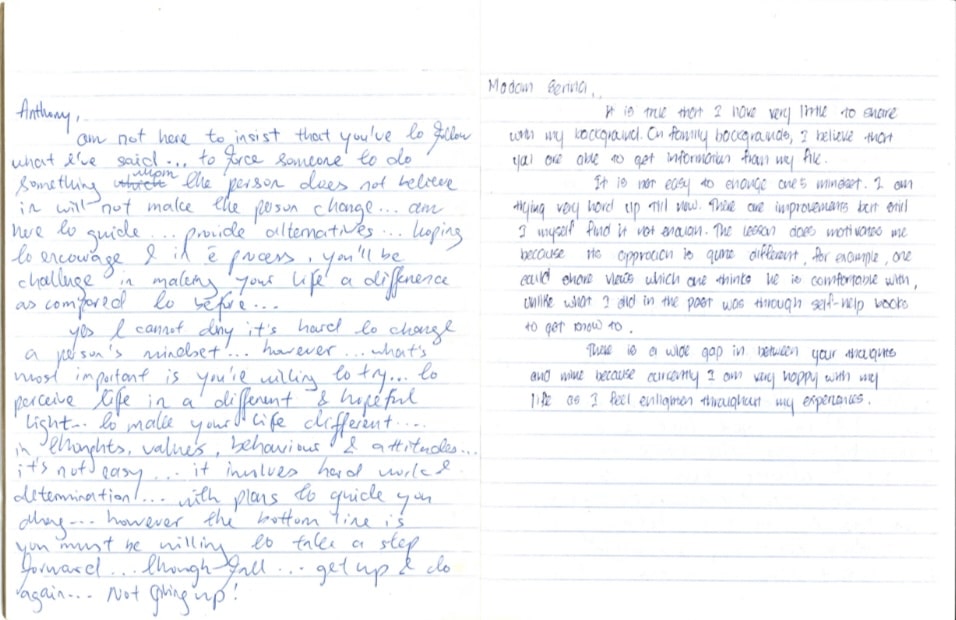
Working things out: An excerpt of the letter exchange in an exercise book between Madam Serina and Anthony.
The process helped Anthony realise that much of the aggression he displayed was due to him being the “Dai Gong”. He felt he needed to maintain a standard of “law and order” by standing up for his own gang.
The anger also acted as a façade, as he could not let others view him as being “weak”.
There were other conflicting emotions within him. Despite being one of the troublemakers, he despised his own kind and kept to himself.
He wrote all these reflections in his journal, and Madam Serina gave her perspective in her weekly replies.
The 100 days egg
Before long, Anthony was due to break his “100 days egg”. In prison, breaking one’s “100 days egg” was a milestone that prisoners would count down to, as it meant that they only had another 100 days to go before being released.
Anthony was so overwhelmed with emotion that he could not sleep.
No actual eggs were broken; the term was used because the “00” in “100” looked like eggs. It signified a psychological shift when prisoners would prepare themselves for life outside.
The night when Anthony broke his “egg”, he was so overwhelmed with emotion that he could not sleep. As he tossed and turned in his bed, an idea came into his mind.
“Every morning, all these Christians would read that small book. Let me go find out what they are reading,” he thought.
‘Everything is meaningless’
In the dead of the night, he went over to a drawer and took someone’s copy of the Our Daily Bread devotional.
He was riveted and read it cover to cover that night. Priding himself on being able to enjoy philosophical reads, he allowed the verses of Ecclesiastes cited to speak to his heart.
“When I read the ‘Everything is meaningless’ verse in Ecclesiastes, I saw its truth and found it meaningful.”
“There I was, planning to get out of prison and level up to organise crime better, but when I read the ‘Everything is meaningless’ verse in Ecclesiastes, I saw its truth and found it meaningful.”
That same night, a fellow dorm mate happened to wake up to go to the toilet and chanced upon Anthony reading in the dark. He was shocked to see that the scary gangster in his dorm was actually reading Our Daily Bread.
The next day, the dorm mate plucked up his courage and mentioned what he saw the night before as a conversational starter to invite Anthony to chapel that week.
Anthony accepted the invitation.
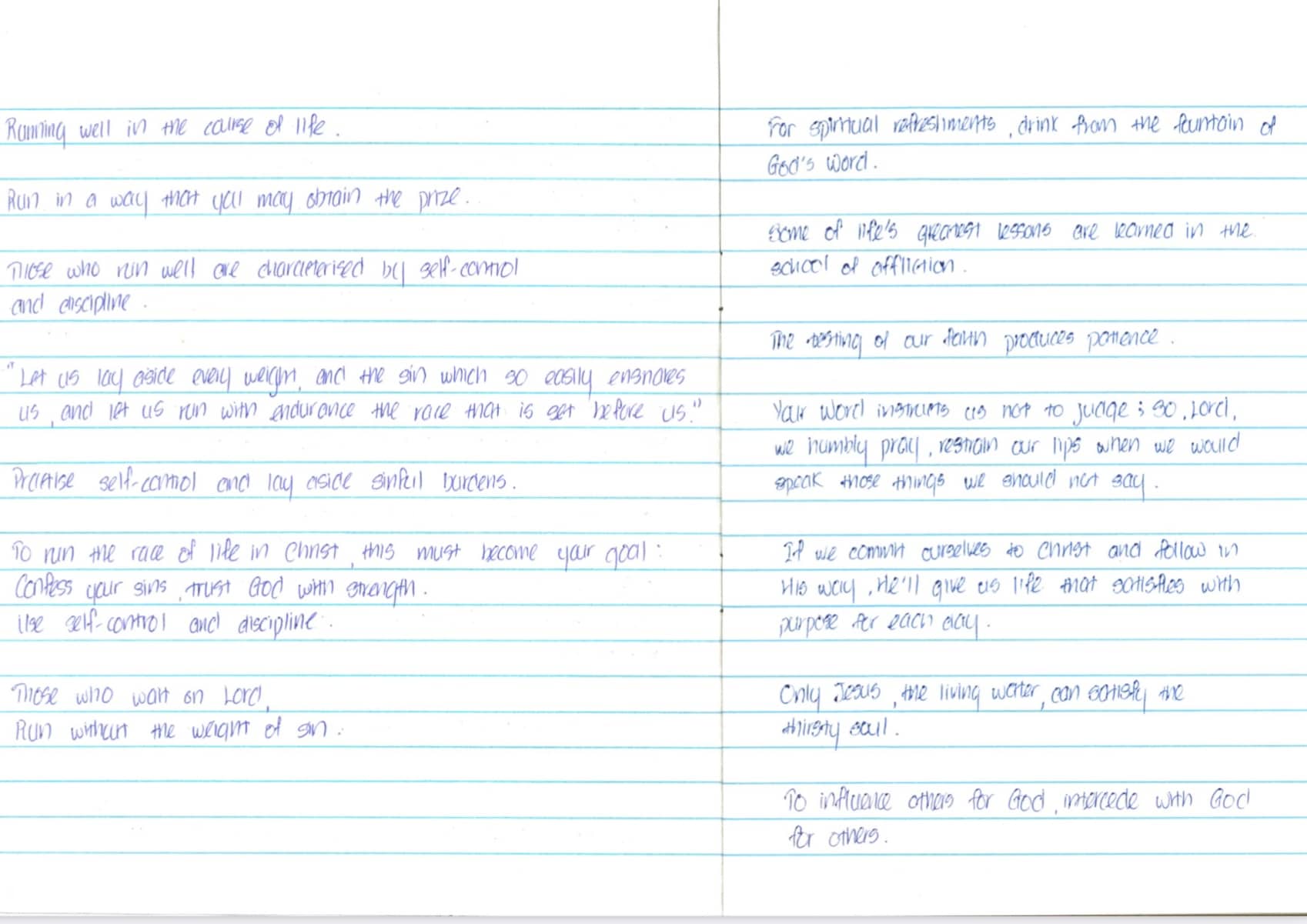
An “eager learner”: Anthony wrote down the concluding line of each devotional in Our Daily Bread as a way of imbibing life lessons and truths.
The basketball court
Anthony spent the next few days writing in his notebook the concluding line of each devotional, which offered him food for thought for the day.
But, despite his growing spiritual interest, he was still himself during the yard time when inmates could choose to play basketball.
The basketball court was a prime spot for tensions to build. Some inmates used the game as an outlet to relieve stress, and fights would occur when emotions ran high.
In the heat of a game, Anthony and another inmate clashed. He thought the other guy had deliberately elbowed and pushed him. After the game, visibly annoyed, he began asking others who the guy was and which gang he belonged to.
“Everyone knew I was looking for this guy. I was sniffing him out and preparing for a fight,” said Anthony.
Later that same week, Anthony went for chapel service for the first time. As he was walking in, the Hokkien song “Kan Wa Eh Chiu” (“Hold My Hand”) was being sung.
“There was something different about the atmosphere. The song was meaningful and I felt peace.”
He recalled: “There was something different about the atmosphere. The song was meaningful and I felt peace.”
As he allowed himself to soak in the atmosphere, the last line in the song, “(God) telling me, ‘Come in My child’ ” brought back memories of his late earthly father.
Tears formed in his eyes and started rolling down his cheeks.
He did not know what was happening to him. It was the first time he had cried in prison, and he knew it was considered shameful for tough criminals like him to be seen crying.
Before he could quickly wipe away the tears, the worship session stopped. The service leader told everyone to shake hands with others around them as a gesture of welcome.
Through his teary eyes, he saw the person in front of him turning around. Lo and behold, it was the exact person everyone knew he was looking to pick a fight with!
All the inmates around them stared, wondering what would happen next.
Somehow, Anthony pushed his hand out to shake the other inmate’s hand.
Everyone was stunned, including himself. His extended hand reminded him to let go of his pride, anger and need for revenge.
How do I pray?
During his one-to-one session with Madam Serina, she praised him for the progress he had made and challenged him to seek further mindset change.
“I know it is not easy to change your thoughts, values, attitudes and behaviour. I noticed you have been going for chapel service. Why not pray and ask God to help you?” she told him.
Anthony replied that he did not know how to pray.
“Just like you have been writing letters to me, you can pray by writing a letter to God,” she said.
Out of curiosity, he asked her which church she attended. “We are based at Orchard Hotel,” was her reply.
First prayers
Back in his dorm, Anthony wrote his first prayer to God. It was just one to two sentences long, asking God to help Madam Serina with her work and daily life, since he had been a beneficiary of the good work that she was doing.
He spent another sleepless night processing what had made him behave the way he did at the first chapel service. And since he could not sleep, he started mimicking the way the other Christians in his dorm would sit, facing the wall as they did during their quiet time.
“I started remembering everything that happened, including the bad things I had done.”
With his legs crossed, he started to try to pray and talk to God.
As he began asking God what had happened that day, he felt a waterfall-like sensation falling upon him. Simultaneously, he began seeing in his mind’s eye flashbacks of various scenes in his life.
“I started remembering everything that happened, including the bad things I had done.
“But strangely, I was also brought back to the time when I was at Chen Su Lan children’s home and how I watched a Christmas play on the Good Samaritan story, of the offering bag being passed around as we sat in the pews and praying before we ate.”
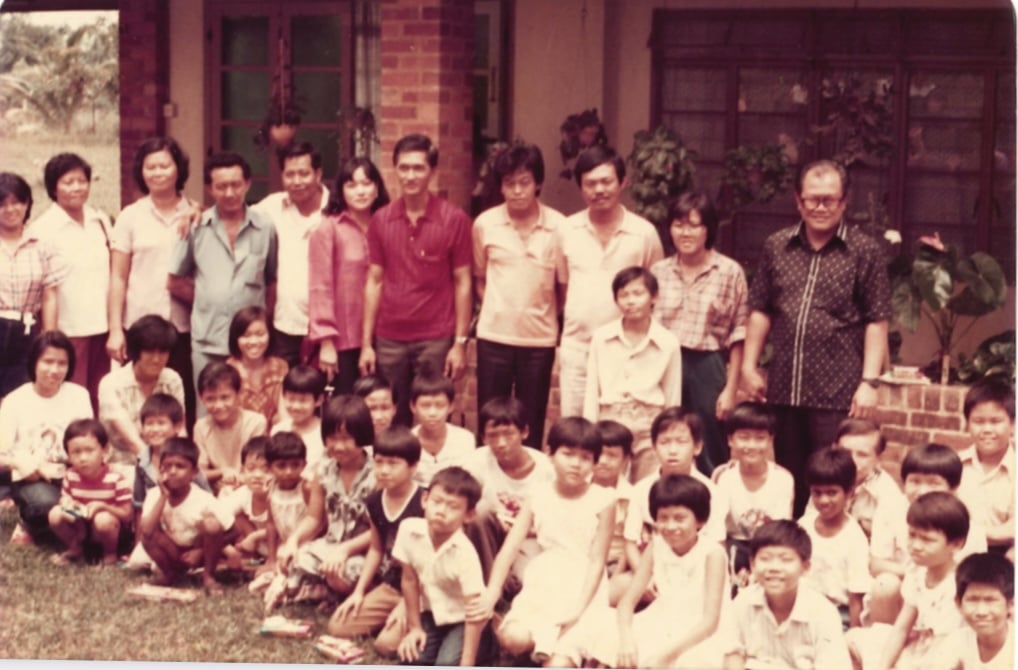
Days gone by: Anthony (front row, centre) with his older sister holding onto his arm, with children and staff at Chen Su Lan Methodist Children’s Home.
For two to three hours, Anthony just sat crossed-legged on the floor, reliving his past as he experienced water washing over him.
“I really wanted it to stop, because seeing all the bad things I did made me so uncomfortable. But I somehow could not get up.”
“There was no pastor around, but it was then that God set me free by washing me clean.”
Only later did he learn that it was the Holy Spirit filling him and washing him clean of all his past transgressions and the condemnation and guilt he felt over them.
The playback included memories God had preserved of the times when the seed of faith was deposited, including of the early Chen Su Lan days when he was just a toddler.
After experiencing such a personal encounter with God, Anthony felt much lighter, as if a load had been lifted off his shoulders.
“There was no pastor around, but it was then that God set me free by washing me clean,” said Anthony.
He began to understand more deeply what 2 Corinthians 5:17 meant: “If anyone is in Christ, the new creation has come. The old has gone, the new is here!”
A free man
December 18, 2001 was the fateful day of his release. Anthony walked out of prison a free man — and did not expect to see anyone.
The prison officers and counsellors had repeatedly reminded inmates that their first stop upon release should be home.
But his old 18 gang members were outside the prison gates to receive him the moment he stepped out. Taken aback, he could only blurt out: “I am so happy to see all of you!”
“Wah, you go in speaking Hokkien but you come out speaking ang moh (English),” one of them remarked in Hokkien, teasing him.
Anthony suddenly felt awkward. “Do I really want to go back to my old life?” he wondered as he left with his old gang members.
Divine appointments
By the grace of God, the divine encounters he’d had in prison remained with him, and Anthony hungered to learn more.
On the first Sunday after his release, he dressed up in a nice shirt and pants and made his way to Faith Community Baptist Church (FCBC) at Jalan Bukit Merah.
The volunteers at the prison chapel service had been from FCBC and they had said their service started at 8.30am.
He reached the church at that time but did not see anyone around. He waited for close to an hour, yet did not see a single soul.
“I am not going to church anymore,” he muttered in frustration as he flagged down a cab to head back home.
When the taxi driver asked him where he wanted to go, a Voice within him whispered: “Don’t you know of another church to go?”
It was then that he recalled Madam Serina’s mention of her church at Orchard Hotel – Centre of New Life – and directed the taxi driver there.
Its service started at 10am so it had just begun when he arrived. An usher welcomed him and asked if he was looking for anyone.
“Madam Serina,” he blurted out.
The usher hesitated, then realised who he was looking for. The usher happened to be Serina’s sister, and quickly figured out that the new visitor probably knew her sister from prison.
From then on, Anthony began attending Centre of New Life regularly. The pastors there were informed of his past, and one of them went out of the way to disciple him by doing Bible study with him every Wednesday.
Serina also took the initiative to be accountable to her superiors at work, and informed them that a former prison inmate whom she had counselled was now attending her church.
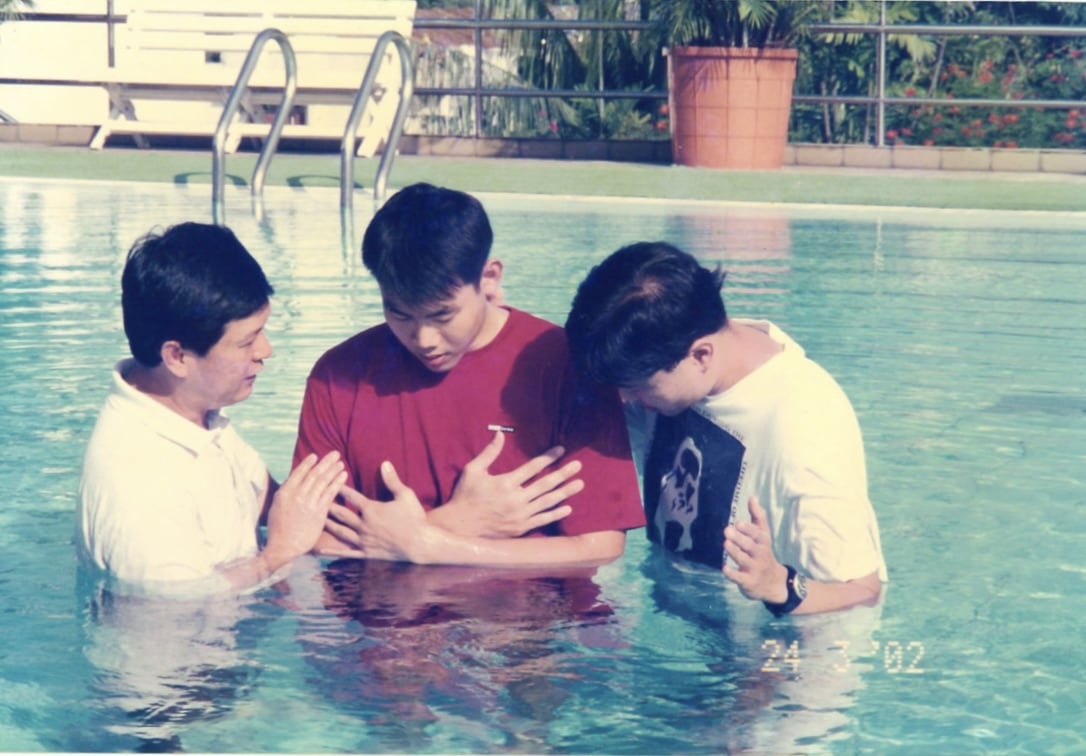
A step of faith: Anthony was baptised while he was with Centre of New Life.
The ‘old man’ in him
Yet, the seduction of the world and his old lifestyle proved too tempting for Anthony.
Together with his gang members, he set up an illegal loanshark and bookkeeping business. The loanshark business was funded by the inheritance his late father had left him.
“It was easier to go back to what I was familiar with to earn money,” he admitted.
So, he led a double life: Bible study and cell group on Wednesday, church on Sunday, and his loanshark business the rest of the week. “I still had to earn money to put food on the table,” he rationalised.
“It was easier to go back to what I was familiar with to earn money.”
However, he felt the stress and tension of living a double life.
He knew that Serina was aware that he was dabbling in an illegal business but did not feel compelled to do anything about it, until God sent a zone pastor to visit his cell group one night.
During the cell group meeting, the pastor shared about how he had just ministered to a loanshark who decided to give up his $300,000 business and go to church.
Anthony was convicted by the testimony and felt God speaking to him about his situation. The very next day, he decided to cut off ties with his gang members and cease the loanshark business.
He passed his work phone to his sister and told her to inform any callers that he would not be using that number anymore.
He also gave up on the loans he had already given out, which meant that he would not collect back most of his money.
Drawn to the things of God
Penniless, Anthony went for many job interviews but did not hear back after any of them. Back then, the stigma of hiring ex-offenders was strong. He would go on to start his own businesses like selling lady’s privilege cards, selling ad spaces and running exhibitions.
In 2003, he found himself hungering more for the things of God and decided to go to Bible school to get a diploma in Theology while exploring his calling to full-time ministry.
He ended up getting both his diploma and bachelor’s degree from the Assemblies of God Bible College (now known as ACTS College) and pioneering a church – Radiant Community Church – in 2005.
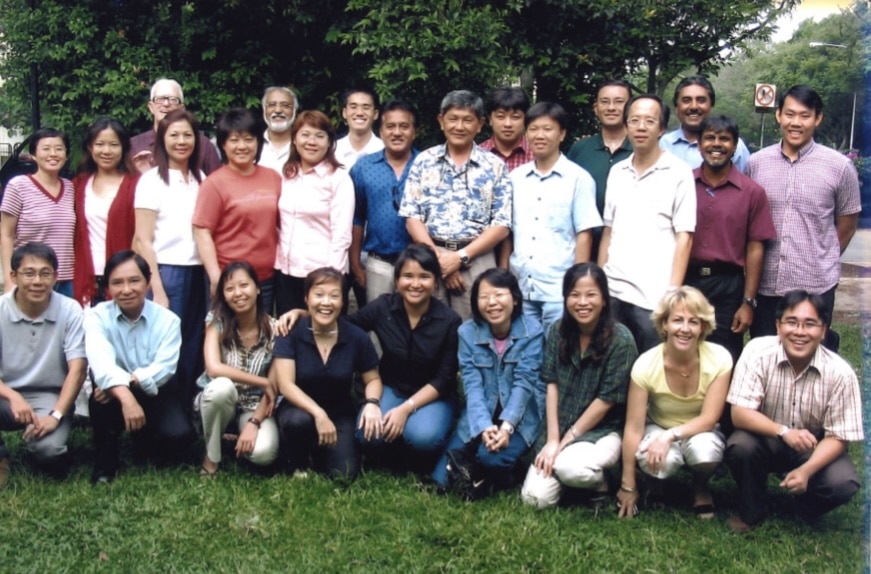
Called to full-time: Anthony (pictured here with his classmates) signed up for theological studies at the Assemblies of God Bible College.
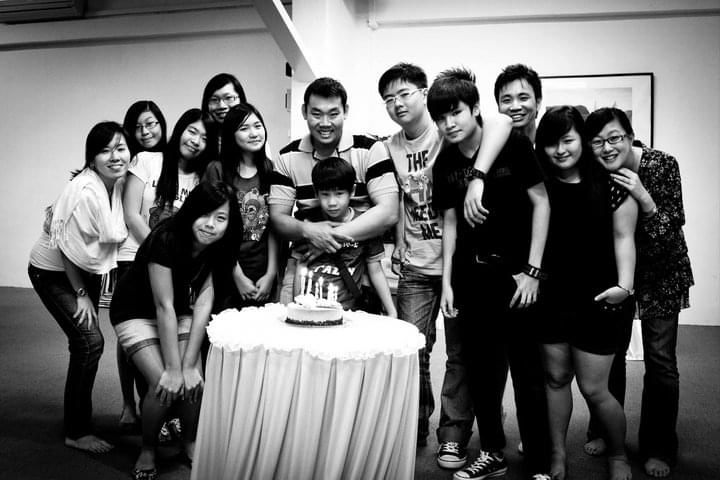
Fresh beginnings: Anthony celebrating his birthday with members of Radiant Community Church, the church he pioneered.
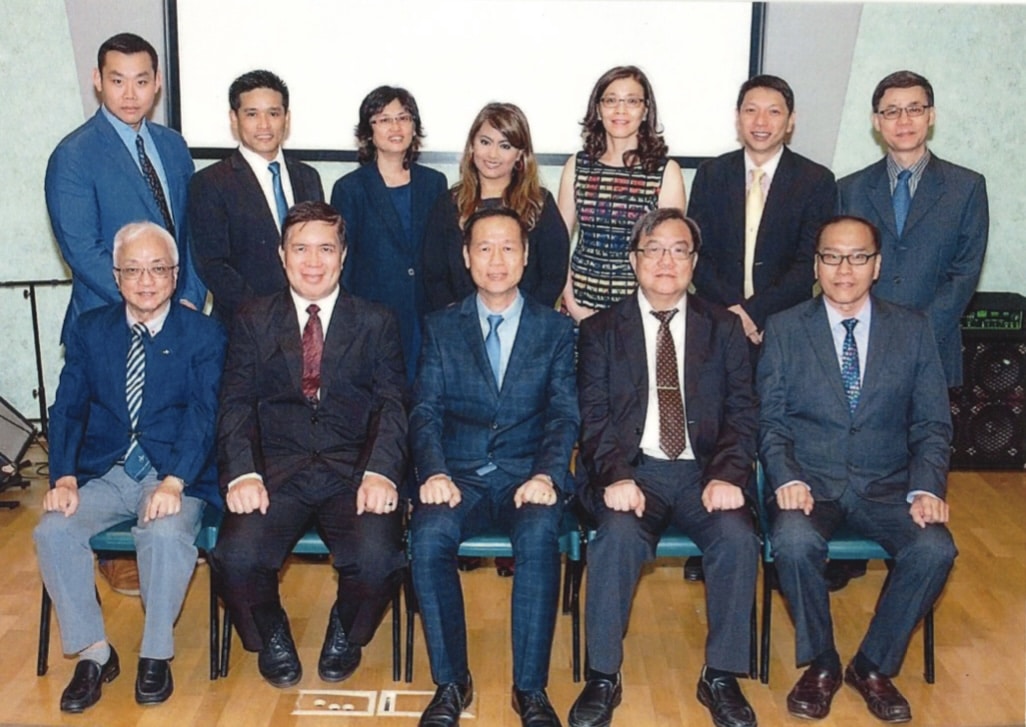
Suited for ministry: Anthony (top left) serving as the youth, young adult and evangelism pastor at Eternal Life Assembly, alongside the rest of the staff team.
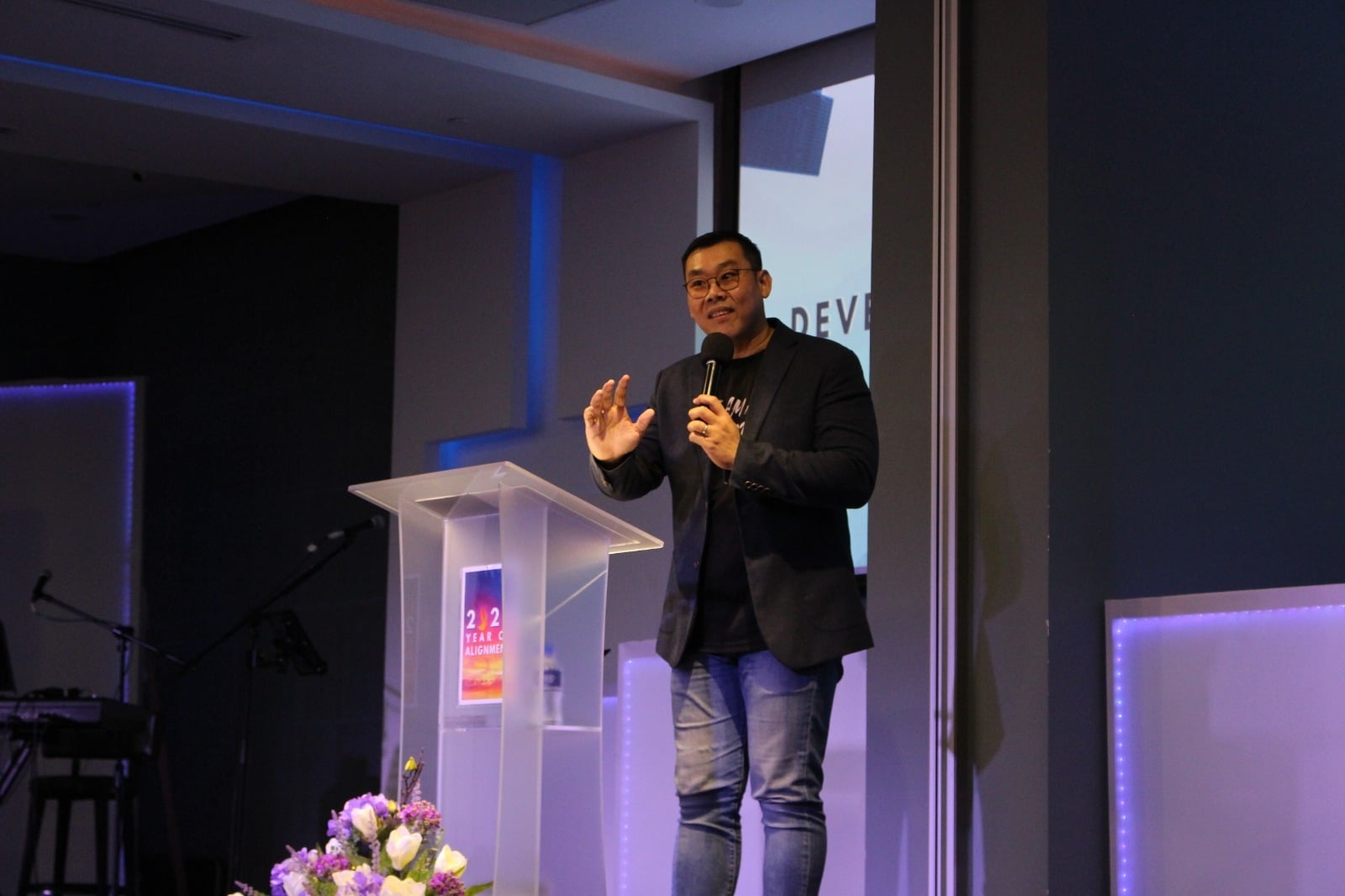
A new creation: Anthony, Sembawang AOG’s lead pastor, preaching at a service.
He later became a pastor at Eternal Life Assembly for seven years. Since 2019, he has been Sembawang AOG’s lead pastor.
“I have always been open to the church about my past and it’s God’s grace that the leaders and congregation trusted and supported me in leadership.”
Marriage and family life
As for “Madam” Serina, Anthony found himself growing closer to her. He began courting her a year after joining her church.
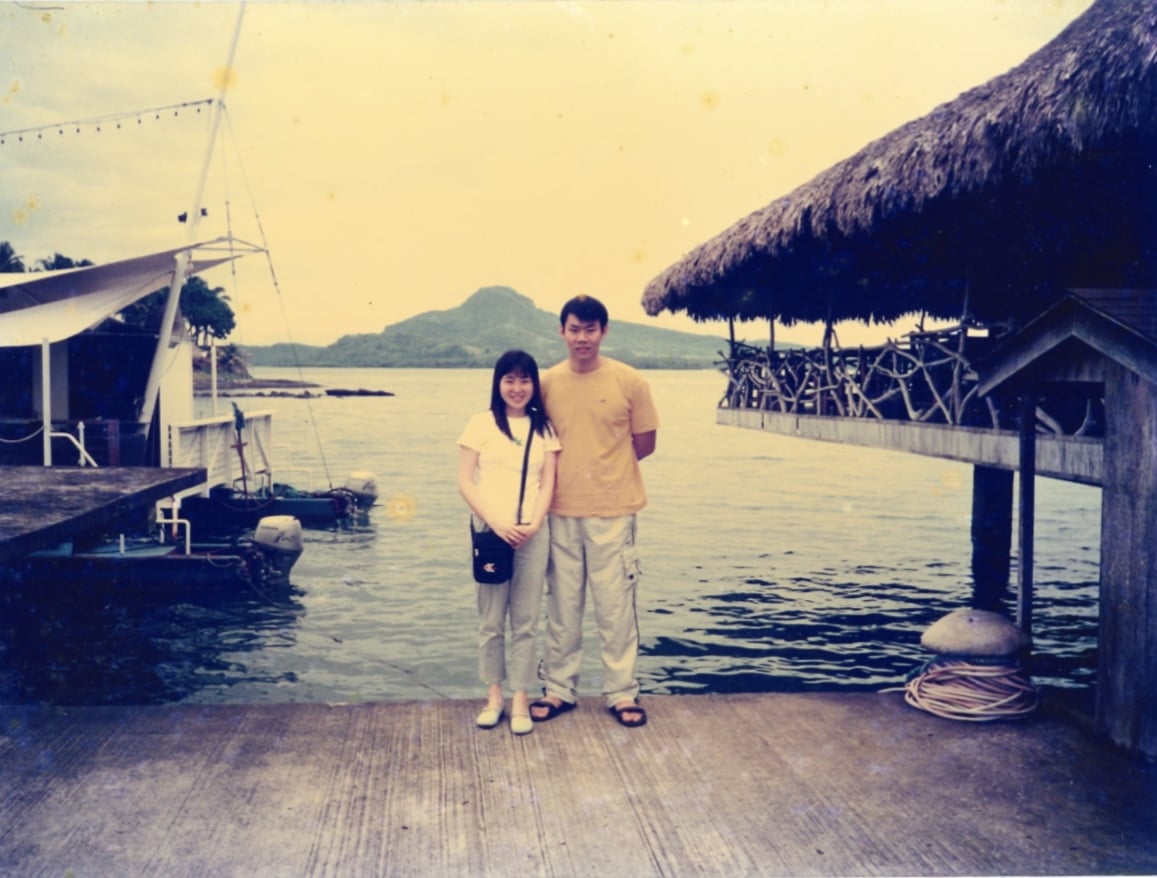
To the ends of the earth: Anthony and Serina on a mission trip to the Philippines.
Of course, she had her own reservations about him. She was not sure what kinds of boundaries to draw around him as she was his former counsellor in prison. If they really got together, how was she supposed to explain the situation to her family and friends? she wondered.
It was not the case that she felt superior to him. Instead, she lacked the confidence to date and get married as she was from a family with broken relationships.
Yet, she saw something in Anthony – an earnest and sincere faith in God. Having also witnessed the huge transformation he had undergone, she took a leap of faith and said “yes” to him.
Out of professional accountability and other reasons, she left her job at the prisons. They dated for two years and got married in 2004.
They have a son, Matthias, who is 14 years old this year.
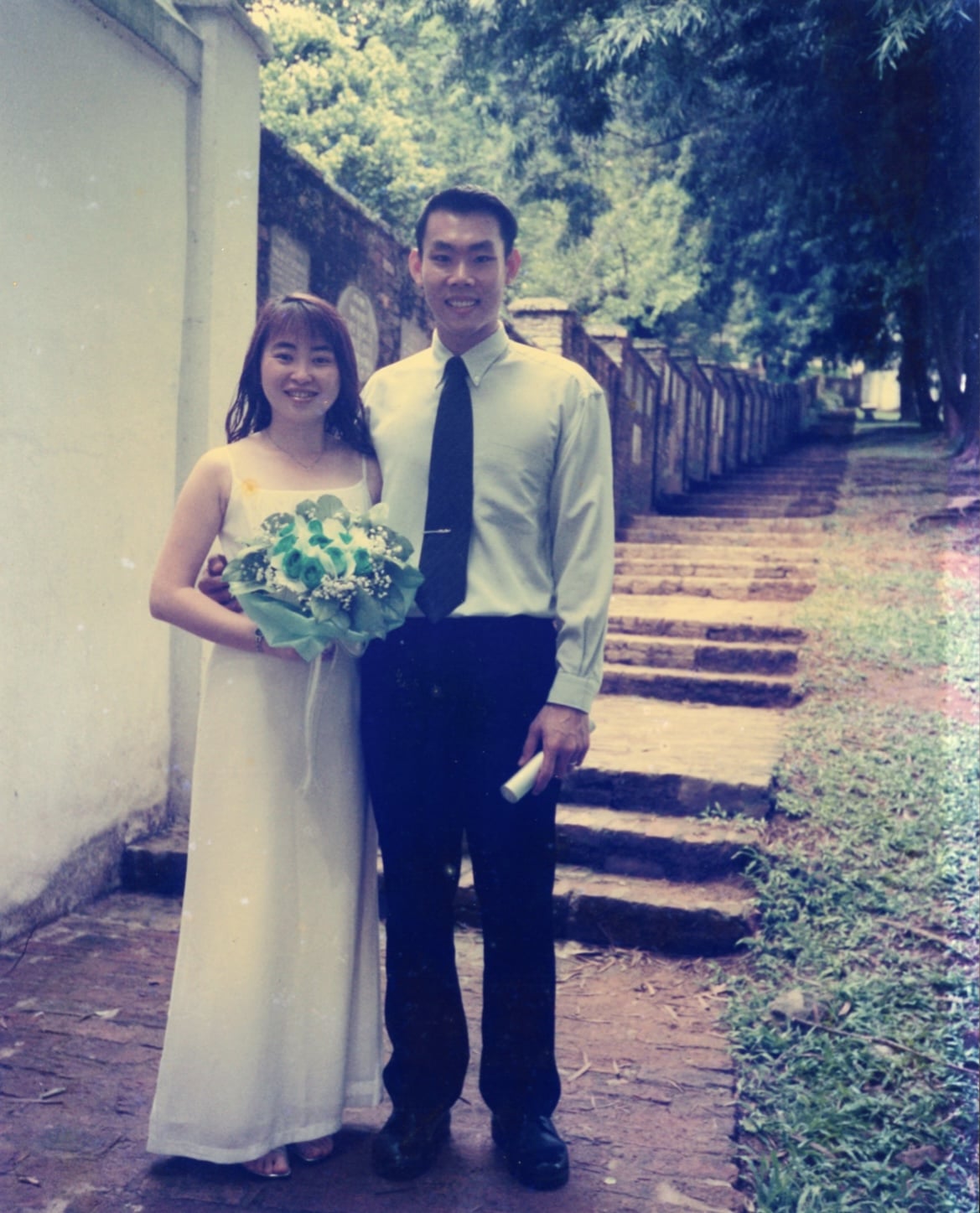
A leap of faith: Serina and Anthony tied the knot at the Registry of Marriage after a difficult period of courtship.
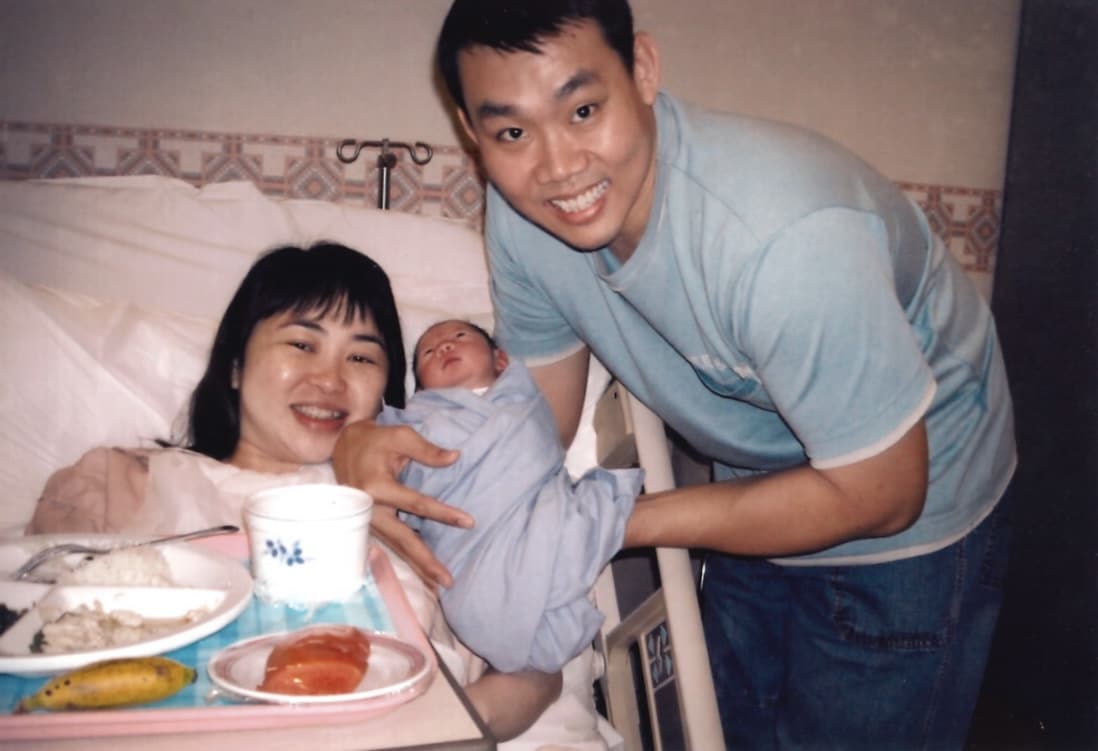
Proud parents: Baby Matthias Chua Yang En was a gift of God to Serina and Anthony in 2008.

Family first: The Chua family in more recent times.
“His Chinese name is ‘Yang En’, which means to proclaim the grace of God,” said Anthony.
“That is the story of my life. It is the constant grace of God that draws me to Him in every season of my life.”
RELATED STORIES:
“God is bigger than chilli padi!”: How the Unlabelled Run is transforming lives
We are an independent, non-profit organisation that relies on the generosity of our readers, such as yourself, to continue serving the kingdom. Every dollar donated goes directly back into our editorial coverage.
Would you consider partnering with us in our kingdom work by supporting us financially, either as a one-off donation, or a recurring pledge?
Support Salt&Light